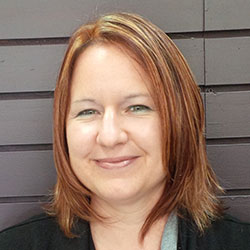- How did you learn about the program and what motivated you to enroll?
-
I learned about this program through the Canadian Association of Geographers website as I was a member of this group in 2013 and have a degree in Human Geography. At the time I enrolled in the program, I was working directly in population health research and I felt that I needed to upgrade my data analysis skills.
- Tell us about your course experience. What skills did you develop and which courses provided the greatest benefit to you?
-
In the past, I had done one short online course in mapping within my Master’s program but it was primarily a theoretical course. I was attracted to the PHDA program because of the applied nature of the courses. I found all of the PHDA courses very useful, and at different times during my program different courses served me better. For example, I was doing mapping in my job when I took the Population Health and GIS (PHDA 03) course. Then later I happened to be using statistics in my job when I took the Epidemiological Statistics (PHDA 02) course. In hind sight, I wish I had completed the courses in order of least difficult to most difficult, as the order in which I took the courses affected the learning curve involved for me. (i.e.: I did PHDA05 before I had taken PHDA01 where I could have learned basic SAS skills). I found PHDA03 and PHDA02 the most useful to me as they supported my immediate work needs the most.
- How have you been able to (or how do you plan to) apply your new skills in your work/research?
-
Over the two years (2013-2015) it took me to finish the program, I had three different jobs. All of them have been contract or maternity leave positions, and I believe the data analysis and mapping skills have helped me to be employable in each situation. All the courses have supported my knowledge, skills and confidence to use data more effectively. In particular the way I approach the organization, structure and use of data has benefitted my work in many ways.
- What do you think were the strengths of this program? Please provide examples.
-
I liked the knowledge of the instructors. They seemed very willing and able to give constructive and positive feedback, even at times when I struggled most with personal issues that affected my ability to do my best coursework. I liked being able to use an applied project in PHDA03 to complete one of my course assignments as it made the learning very applicable to the real world. I feel the certificate was a great complement to my human geography work during my masters in environmental science.
- Would you recommend this program to others? If so, what recommendations/suggestions would you give those interested in applying to this program?
-
I would highly recommend this program to anyone wishing to gain a strong foundation in GIS and data, even those individuals not directly involved in the population health field. All of the courses force the student to think critically, develop time management skills, become effective data organizers, and learn to work in a virtual team towards a common goal within very tight parameters. I found all staff related to the various components of the program very knowledgeable and considerate.
- Any additional comments you would like to add?
-
I found the course formats to have a strong mix of individual learning, group work, academic research, and practical data analysis application. I was fortunate to obtain funding from CIHR to take this program and also benefitted from gaining the student rate for the courses. I would encourage others to look at these options early as they are time and availability sensitive but are definitely worth the effort and personal follow up.

